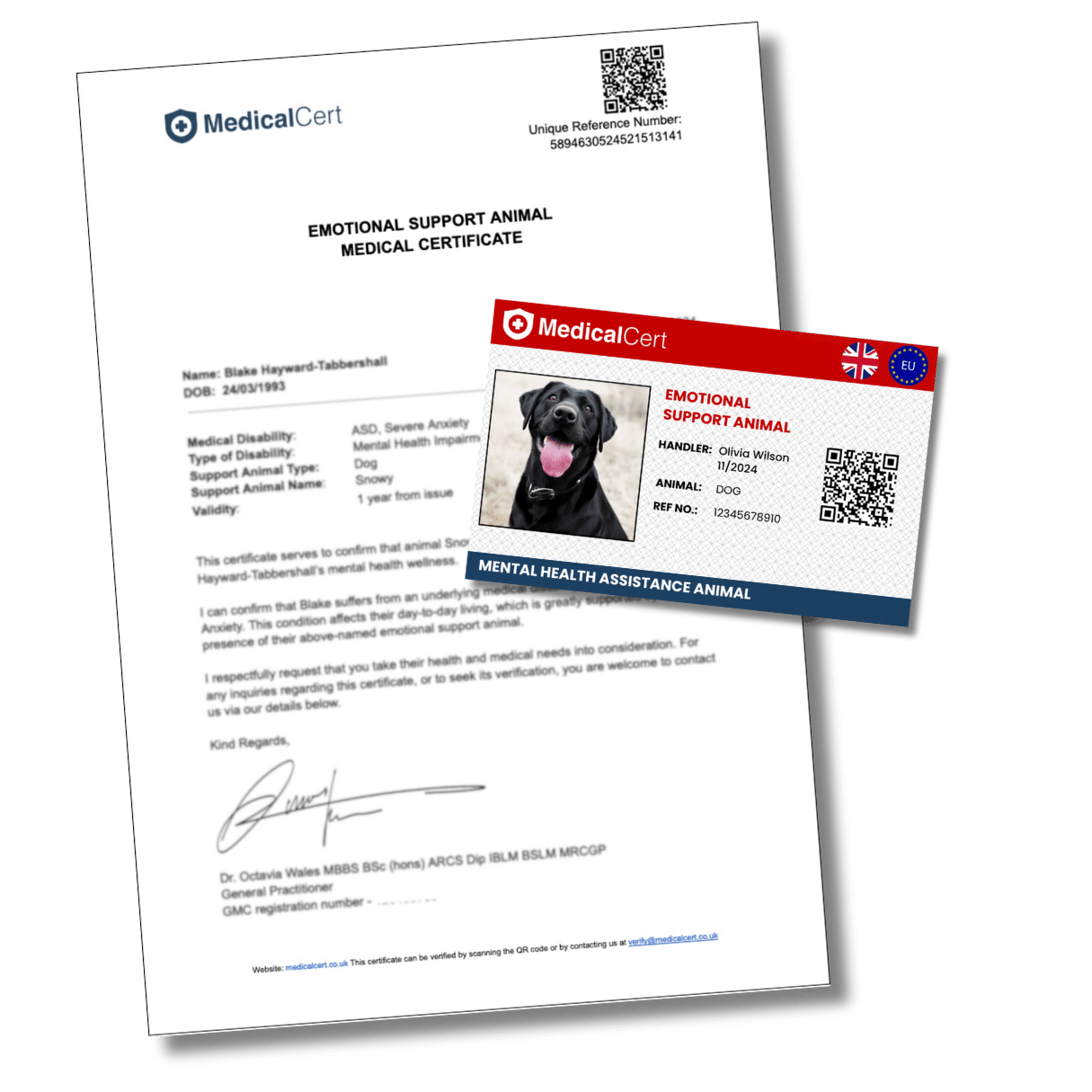Get a Support Dog
We provide you with a quick and convenient way to get an emotional support dog for the UK and EU from £45.
✓ Apply 24/7 with no appointment necessary
✓ Suitable for landlords, housing associations, entertainment facilities, and workplaces
✓ Certificates signed by a fully-registered UK Doctor
✓ Sent to your inbox by 9am with overnight service
LET'S GET STARTED



Get your medical certificate delivered straight to your inbox from £37


Emotional Support Animal (ESA) Certificate
An Emotional Support Animal Letter is a document that verifies the need for an emotional support animal as part of a person’s treatment for a disability or mental health impairment.
Our medical practitioners can issue a hassle-free ESA certificate on the same day or overnight, straight to your inbox.
This certificate will confirm the details of your animal as well as your disability and how it affects you.
Apply online now.
LET'S GET STARTED

What will you receive?
You will obtain a verifiable digital PDF Emotional Animal Support certificate and optional digital card bearing the signature of a registered medical doctor, sent directly to your mobile device. This document will include the following information:
✓ Confirmation of your emotional support animal and type.
✓ Your name and DOB
✓ Details of your mental health concern or disability and how it affects you.
✓ Signed and authorised by one of our GMC-registered UK doctors.
✓ Your certificates unique reference number and QR code for verification.
✓ Optional digital photo-card to carry on your phone (+£10).
How it Works

01
Complete a short online form
Simply complete a consultation form with the details of your animal and your disability. Upload a 30 second video explaining how your animal assists in your disability, as well as medical documentation of your condition.

02
Doctor Reviews Application
One of our FCDO and GMC registered GPs will review and validate the submitted information. Once approved they will sign an official ESA certificate and ESA card for you.

03
Receive your certificate
Receive your emotional support animal (ESA) certificate as soon as same day or next working day, straight to your inbox. If we cannot provide you with a certificate for any reason, you'll automatically receive a full refund.
LET'S GET STARTED
PRICING
Who Qualifies For An Emotional Support Animal?
Any adult or child with a disability may qualify for an emotional support animal. Disability, in this instance, refers to anything that makes your life harder on a day-to-day basis. This could include:
- Anxiety
- Depression
- Post Traumatic Stress Disorder (PTSD)
- Autism Spectrum Disorders (ASD)
- Personality Disorders
- Schizophrenia
- Phobias
And any number of other emotional challenges you might encounter on a daily basis. Animals have a proven beneficial impact on mental health and wellbeing. As a result, there are all sorts of situations where one can benefit from having an emotional support animal.
24/7 Applications
Doctors online overnight

FREQUENTLY ASKED
Questions
How do I get an urgent emotional support animal (ESA) letter or certificate?
It’s quick and easy! Simply complete the brief online questionnaire and complete the payment. After purchasing your medical letter online, a doctor will review the medical evidence the same day and we will provide you with your unique medical certificate for you to present to your work place or institution. There is no need to have a telemedicine or online consultation to receive a medical letter. Our Doctors may call or email you directly if they have any additional questions.
Can I get an emotional support animal (ESA) letter or certificate without seeing a doctor?
All medical letters including emotional support animal (ESA) certificates are signed and certified by a doctor, but you do not always need to see a doctor in person to get one. Our revolutionary service allows you to be assessed by one of our doctors without needing an appointment, simply by uploading information about your emotional support animal (ESA) and disability through our forms. One of our doctors will then consider your application before issuing your medical certificate. You will then receive the letter directly to your inbox.
Can I name multiple pets on the same ESA letter?
Yes, you can register multiple pets on the same ESA letter. At Medical Cert we can accommodate up to two pets per letter for no additional charge. The request for multiple pets must be reasonable, and approval for multiple ESAs is determined by the medical provider and each one of the ESAs must assist in different ways. If you have 3 or more ESA's this will require an additional letter, which can be purchased as an add-on. If you have any questions about this process, please contact help@medicalcert.co.uk.
What medical evidence will you require?
We will require you to upload: ✓ A photo of your ID to confirm your identity ✓ A photo of your animal ✓ Confirmation of your mental health condition or disability (this can simply be a copy of your GP's summary care record which is available on request or any medical documentation of your illness) ✓ A completed online consultation form
Do you provide refunds?
We always provide full refunds if we are unable to provide a Medical Letter in your situation, so you can submit your requests with peace of mind. Once a medical certificate has been issued we are unable to offer refunds.
How soon will I receive my ESA letter or certificate?
Our team of GPs will review your medical evidence and questionnaire on the same day and provide you with your Medical Letter or Certificate within 1 working day. We also offer a guaranteed by 9am service for applications that have been uploaded by midnight. With our express overnight service you will receive your medical letter or certificate in your inbox overnight by 9am next day. For example, an application submitted at 11pm on a Thursday night will be assessed and delivered by 9am on Friday morning.
Who will sign my emotional support animal (ESA) certificate?
All of the doctors at Medical Cert are fully licensed GMC-registered GPs, unlike many other services who use very junior non-specialist doctors, which may sometimes cause their letters to be rejected. You can submit any letters you receive from Medical Cert with full confidence, knowing that an experienced GP has signed your document. We are a UK based healthcare service but the certificates can be used internationally. All of our Doctors are registered GPs with the UK General Medical Council.
Can your emotional support animal (ESA) letters be verified?
Absolutely. Each letter or certificate issued will have a unique reference number and QR code that can be scanned for verification. Alternatively, letters and can be verified free of charge by emailing us at verify@medicalcert.co.uk.
Do I have to register my emotional support animal on an official database?
Contrary to popular belief, there is no official or government registry for emotional support animals or assistance animals in the UK or EU. You are not obligated to register your assistance dog or emotional support dog to establish its legitimacy. Any companies or websites selling ESA registration for a fee are likely a scam or illegitimate.
Are landlords and businesses guaranteed to accept my ESA letter?
In the UK, EU, and USA businesses and landlords are not legally obligated to accept ESA letters, although most will take an ESA letter into consideration.


About Us
Medical Cert
-
Medical Cert is powered by experienced general practitioners providing quick & hassle-free GP certification services
All of our doctors are licensed GPs who hold full registration with the UK General Medical Council and have extensive experience in providing high quality clinical care in various NHS and private settings. All of our doctors are registered with the FCDO and authorised to issue visa medicals.

How To Get A Support Dog

Feeling overwhelmed with mental health struggles? Support dogs can offer a unique form of help. This blog will guide you on how to get a furry friend that provides emotional and physical support.
Keep reading to discover more.
What is a Support Dog?
A support dog is trained to provide affection and comfort to individuals dealing with emotional or mental health issues. These dogs offer companionship and assist in alleviating stress, anxiety, and depression.
Types of support dogs
Support dogs come in many forms, each trained for specific tasks to help their owners. These animals play a crucial role in improving the lives of individuals with various needs.
- Emotional Support Dogs: These companions provide comfort to people suffering from mental health conditions like depression and anxiety disorders. Unlike service dogs, emotional support animals don’t require specialised training but need an ESA letter from a mental health professional for legal recognition.
- Therapy Dogs: Often found visiting hospitals, schools, and care homes, therapy dogs help reduce stress and promote happiness among groups of people rather than offering individual assistance.
- Service Dogs: This category includes several types of assistance dogs trained to perform tasks for people with disabilities. Guide dogs lead visually impaired owners safely around obstacles. Hearing dogs alert deaf individuals to important sounds. Mobility assistance dogs assist those with physical disabilities by fetching objects, opening doors, or pulling wheelchairs.
- Medical Alert and Response Dogs: These are highly skilled canines that detect medical issues such as high blood sugar levels in diabetics or warn their owner before an epileptic seizure occurs.
- Psychiatric Service Dogs offer support to those with mental disorders beyond anxiety and depression, such as post-traumatic stress disorder (PTSD) and bipolar disorder. They can interrupt harmful behaviours, remind their owner to take medication, or perform room searches for safety checks.
Each type of support dog undergoes rigorous training to meet the specific requirements of their future owner’s condition or disability. Organisations like Assistance Dogs UK (ADUK) provide valuable resources for disabled people considering getting an assistance dog, including an ADUK identification booklet that explains the roles these animals play.
After introducing the types of support dogs available, it’s essential to understand how one can qualify for an emotional support dog or apply for an assistance dog depending on your specific needs.

Their purpose and benefits
Support dogs offer incredible help to people with various needs. They carry out specific tasks for individuals facing challenges due to disabilities or illnesses. These faithful animals fetch items, assist in dressing and undressing, and even alert their owners to high blood sugar levels.
With this assistance, owners gain more independence in their daily lives. Charities such as Dogs for Good provide information guides that detail how these canines support adults in need.
These companion animals also play a vital role in improving social connections and reducing loneliness. For children with autism or those feeling isolated, a support dog can become a loyal friend who’s always there to listen without judgement.
Assistance dogs undergo rigorous training before they start their important roles. This ensures they are dependable while carrying out the duties specifically for their owner’s requirements.
Becoming aware of these benefits helps potential recipients understand the significant impact a support dog could have on their life.
Exploring how to qualify for an emotional support animal is the next step if you think one could aid you.
How to Qualify for an Emotional Support Dog
To qualify for an emotional support dog, individuals must meet specific eligibility requirements and obtain an ESA letter from a mental health professional. The process involves fulfilling the necessary criteria and obtaining documentation to show the need for an emotional support animal.
Eligibility requirements
Before anyone can get an emotional support animal (ESA) or a service animal, they must meet certain requirements. These rules make sure that the person and dog are a good fit for each other.
- Diagnosed mental disability or emotional disorder: A qualified health professional, such as a psychiatrist, psychologist, or another mental health professional must diagnose the individual. The condition should be one that affects their daily life.
- Need for an emotional support pet: Medical professionals must determine that the presence of an ESA is crucial for the patient’s mental health and well-being.
- ESA letter: Obtaining an official letter from a psychiatrist or another medical professional is vital. This letter confirms the individual’s need for an ESA and should comply with the Equality Act 2010 by outlining how the animal aids in coping with daily activities.
- Understanding of landlord and tenancy agreement conditions: Tenants should know their rights under the Equality Act 2010 regarding keeping ESAs in rented accommodation. They must also understand any terms within their tenancy agreement related to pets.
- Awareness of public access rights: While emotional support animals do not have the same public access rights as service dogs under UK law, knowing where your ESA can accompany you is crucial, including which transport operators like Ryanair and EasyJet allow these pets on board.
- Commitment to care for the dog: Individuals must be able to care for their ESA or service dog adequately, ensuring it is microchipped, holds a pet passport if necessary, and meets all health regulations.
- Knowledge of reasonable adjustments: Being aware of how to request reasonable adjustments in public places and workplaces as defined by the Equality Act 2010 and supported by entities like the Equality and Human Rights Commission.
- Contacting ADUK (Assistance Dogs UK) or similar organisations can provide guidance on applying for assistance dogs trained to aid those with physical mobility problems, hearing difficulties, epilepsy, diabetes, etc., ensuring applicants understand both eligibility criteria and application processes.
- Readiness to make any financial commitment required: Be aware of any fees associated with applying for an assistance dog or maintaining its healthy status through vaccinations and check-ups prescribed by veterinarians.
- Engage with specific charities offering personalised advice: Charities such as Dogs for Good provide information guides for adults considering applying for an assistance dog, offering insights into both eligibility requirements and application steps.
Each item ensures applicants approach obtaining a support dog informedly while aligning with legal frameworks like Americans with Disabilities Act (ADA) in international contexts where applicable.
Getting an ESA letter
After you figure out if you meet the eligibility requirements, the next step is obtaining an ESA letter. This document is crucial as it proves your need for an emotional support animal.
- Find a licensed mental health professional: You must acquire your ESA letter from a qualified psychologist, psychiatrist, or another mental health professional. These experts have the authority to assess whether you have an emotional or psychological condition that qualifies for an emotional support dog.
- Set up an appointment: Contact the health professional and arrange a meeting. During this session, they will evaluate your mental health and decide if an emotional support animal could help your condition.
- Discuss your need for an ESA: Be open about how you feel and how a support dog might ease your symptoms. Mention specific instances where having a dog could improve your quality of life.
- Allow the professional to assess you: The expert will ask questions to understand your emotional disorders better and determine if an ESA could provide the necessary support.
- Receive and review your ESA letter: If they conclude that you would benefit from a support dog, they will issue an ESA letter under their official letterhead. This document confirms your need for the animal and should include their license number and signature.
- Understand what’s in the letter: Your ESA letter will state that you are under their care, suffer from an emotional disorder recognised in the Diagnostic and Statistical Manual (DSM), and that having the dog is part of treatment for this condition.
- Know its uses: You can use this letter to avoid eviction under laws that protect people with disabilities, making it easier to keep domestic dogs in residences with no-pets policies or when travelling with budget airlines that allow these animals on flights.
- Keep it updated: Most landlords and entities require a recent ESA letter, typically less than one year old, so ensure it stays current by maintaining regular appointments with your mental health professional.
Getting this letter is essential for legally securing support from landlords and as proof of the vital role these animals play in managing mental health issues.
Applying for an Assistance Dog
To apply for an assistance dog, individuals will need to go through a thorough process that involves meeting specific criteria and working with accredited organisations. This typically includes filling out an application, undergoing assessments, and possibly being placed on a waiting list before being matched with a suitable support dog.
Process of applying for a support dog
Applying for a support dog involves several steps to ensure you get the right assistance animal for your needs. It starts with understanding your eligibility and extends to making direct contact with charities or organisations that provide these animals.
- Check your eligibility: Before you start, make sure you meet the basic requirements set by the organisation or charity. This often includes having a certain medical condition that benefits from an assistance dog.
- Contact directly: Reach out to the charity or organisation offering support dogs. This is the best way to get detailed information about their process.
- Request an application form: These organisations will provide an application form which you need to fill out accurately, providing details of your condition and how a support dog could help you.
- Provide necessary documentation: Alongside the application form, you may need to submit documents from health professionals such as psychologists or mental health professionals, proving your need for a support dog.
- Attend interviews or assessments: Some organisations require a face-to-face meeting or home visit assessment to understand your environment and discuss how a support dog can fit into your life.
- Wait for matching: Once approved, there is often a waiting period while the organisation finds the most suitable assistance dog based on your specific needs and lifestyle.
- Participate in training sessions: Both you and your new support dog may need to undergo training sessions together to ensure a strong bond and effective communication between you two.
- Receive ongoing support: After placement, many organisations offer continued advice and advocacy, ensuring both you and your animal companion adjust well together.
Throughout this journey, patience is key as finding the perfect match can take time due to the rigorous training service animals undergo and their demand across various disabilities including mobility issues, diabetes management, epilepsy, and more. Each step ensures that individuals receive reliable assistance while also taking into account that these highly trained animals require care and attention from their human partners too.
Member organisations and their roles
Member organisations play a crucial role in the journey of getting an assistance dog. They directly help individuals find out if they qualify for an assistance animal. These charities and organisations provide specialised advice and support to those who have received their emotional support animals (ESAs) or service dogs from them.
The services include helping individuals with various needs, such as mobility challenges, hearing difficulties, epilepsy, diabetes, physical disabilities, and more.
Service dogs from these member organisations undergo extensive training to perform tasks that their owners might find challenging. This training covers actions like dressing and undressing the owner, moving items around for easier access by the owner, and many other daily activities that increase independence and quality of life.
Contacting these charities is the best step towards obtaining a loyal companion trained to meet specific needs.
How Support Dogs Transform Lives
Support dogs provide invaluable support to individuals with disabilities, helping them navigate daily life and build confidence. Their companionship and assistance not only improve the quality of life for their owners but also create a strong bond that enhances emotional well-being.
Real-life stories
Support dogs do more than just assist with daily tasks; they change lives. These real-life stories show the impact these animals have on their owners.
- A young child with autism found a new sense of calm and safety with his support dog. The dog helps to keep him from wandering off and assists in managing overwhelming situations by providing physical comfort.
- Another individual, suffering from severe anxiety, received an emotional support animal (ESA). This support dog has been crucial in helping them venture outside, facing the world with newfound confidence.
- For someone with mobility issues due to a spinal cord injury, their disability assistance dog becomes their hands and feet. The dog carries out tasks like opening doors, retrieving items, and even loading and unloading the washing machine.
- A person diagnosed with diabetes relies on their service dog to detect changes in blood sugar levels before they become dangerous. This early warning system allows them to manage their condition more effectively.
- Users of support dogs have shared stories about how these dedicated animals assist not just physically but emotionally as well. One describes how her dog senses when she’s about to have a panic attack and intervenes by distracting her and providing comfort.
- Adults considering getting an assistance animal have turned to Dogs for Good for guidance. This charity provides information guides that help individuals through the process of finding a suitable canine companion.
- Another account highlights the role of member organisations in matching dogs with owners. These charities train the dogs and offer advice and advocacy for the recipients after the pairing is made.
- A connection between a person who had epilepsy and their support animal is transformational. Examples abound where these animals anticipate seizures and alert others or provide physical support during an episode, to ensure safety.
- Families speak highly of the leash training provided by charities, emphasising how it strengthens the bond between the child, the family, and their new four-legged companion, making outings more manageable and enjoyable for everyone involved.
Now, let us discuss how you can start your journey towards applying for a support animal…
Impact and success stories
Support dogs have had a profound impact on the lives of many individuals. One remarkable story involves an autistic child whose emotional support dog provided comfort and stability during challenging moments.
The presence of the support dog has helped the child navigate social situations more confidently and manage anxiety effectively. This heartwarming example underscores how these extraordinary animals can significantly improve the quality of life for those in need.
Another impactful success story revolves around a person with mobility issues who received an assistance dog trained to perform specific tasks tailored to their needs. With the help of this service dog, they are now able to carry out daily activities that were once difficult or impossible, such as loading and unloading items and dressing and undressing independently.
These stories exemplify the life-changing impact that support dogs have on individuals facing various challenges.
Conclusion
When considering a support dog, eligibility requirements and obtaining an ESA letter are essential steps. Contacting member organisations directly is key in the process of applying for an assistance dog tailored to your needs.
Real-life stories highlight how support dogs positively impact and transform lives, showcasing their vital roles in assisting individuals with various disabilities or health conditions.
These remarkable animals undergo intensive training to carry out specific tasks, demonstrating that they are more than just pets but indispensable companions providing invaluable support to their owners.
FAQs
1. What is an ESA letter?
An ESA letter, or Emotional Support Animal letter, is a document that proves a dog’s role as your emotional support animal.
2. How do I get an ESA letter for my support dog?
To get an ESA letter, you need to consult with a licensed mental health professional who can assess your need for an emotional support animal.
3. Can any breed of dog be considered as a support dog?
Yes, any breed of dog can serve as a support animal provided they offer comfort and aid in managing symptoms of emotional distress.
4. Is there any legal protection for having a support dog?
With an official ESA letter, you are entitled to certain rights such as living and travelling with your pet without additional costs.
